Don Giovanni
Wolfgang Amadeus Mozart (Music); Lorenzo Da Ponte (Libretto)
West Bay Opera
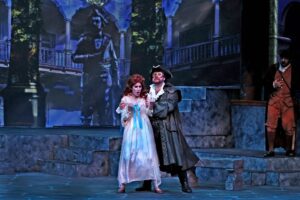
How can an opera about an arrogant, despicable rake who travels throughout Europe seducing women for pure sport and then leaving them often after having promised marriage continue to be one of the most popular, most produced operas of all times? Why in this particular era of “Me Too” do audiences still flock to see the story once again play out before them?
It only takes the “Overture” of Wolfgang Amadeus Mozart’s 1787-premiering Don Giovanni to answer any doubters as to why the continued popularity. In the current West Bay Opera production, Conductor José Luis Mostocovich strikes the downbeat for the magnificent, twenty-five piece orchestra as two thunderous D-minor chords shake the Lucie Stern arena, alerting the audience that a tale leading to dire consequences is about to unfold. As notes full of haunting mystery immediately follow, we watch stage-filling projections of an mansion’s interior full of golden, opulent statutes begin to melt away. As the music swirls in louder fury, flames begin to engulf the scene. In a matter of a minute or two, we hear and see before us the future fate of the title-character womanizer. Even as the overture lightens into delightful allegro of notes rapidly pursuing each other up and down multiple scales, we see the return of the original, richly decorated interior but now with foreboding blue and black wisps and shadows floating in the air. We are reminded that half of Mozart’s original title is Il dissoluto punito, literally, The Rake Punished.
Much of the lasting power of Don Giovanni comes also from its clever combination of high melodrama, splashes of comic relief, and a strong dose of the supernatural that Lorenzo Da Ponte inserted in the libretto, giving Mozart ample opportunity to explore a wide range of musical styles throughout his compositions. Mozart and Da Ponte also ensure that the three latest conquests by the lecherous Giovanni are not helpless victims but are women who become powerful voices for seeking justice and revenge in an 18th century world when probably crimes against women went largely unnoticed/unanswered. In this West Bay Opera production of Don Giovanni, it is these three women characters who reign forth as the true, highly impressive stars of the evening.
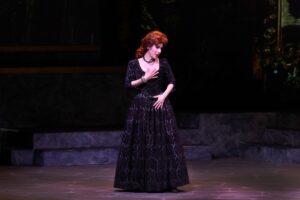
The first of these women we meet is Donna Anna, daughter of the Commendatore of an 18th century Spanish community, as she chases Giovanni, berating him in sopranic, lyrical rolls of notes that clearly express her desperation and fury for a man who has just abused her. This brief introduction of Michelle Drever’s Donna Anna is just a glimpse of the tour de force performance she will deliver the entire evening. When she soon discovers someone has killed her aged father (she does not yet know it was her now-escaped attacker), she invokes her fiancé, Don Ottavio, to “swear to revenge his blood,” singing through piercing eyes and a jaw locked in determination notes that lift in a beautiful harking of his help. When later she knows the perpetrator is Giovanni, her visual countenance intensifies while her voice gloriously pierces with an edge like the sword she wants Ottavio to use on the culprit. Notes once again float to feverish heights, vibrating with her persistence and insistence on justified revenge. Throughout the evening, Michelle Drever commands the stage, equally impressing us when singing barely above a whisper as well as when ringing forth in crescendos extraordinaire.
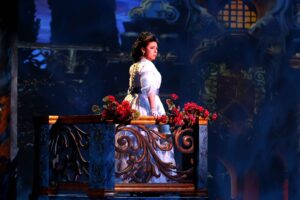
Soprano Shaina Martinez equally wows us time and again in the role of Donna Elvira, an oft-jilted lover of Don Giovanni who wavers between yet one more time forgiving his infidelities and then calling for, even demanding his demise. That contrast is seen in our first encounter with her as Elvira. With a face of full frown and pursed lips, she sings with strong, profound soprano tones that smack with hard, sharpened edges that match the anger she is expressing to the philandering Giovanni. Yet, she cannot help herself and her evident attraction to him, collapsing tearfully on his chest while still singing now with faltering fury of a revenge she believes Heaven wants her to take out on him. Even after more examples of his evil ways with women and his betrayal of her continue to come to her attention, Shaina Martínez leaves us near the end with maybe her evening’s best performance of many strong ones when her Donna Elvira sings of her fear of “thunderbolts” that will soon strike the heart of Giovanni, conveying her misery and extreme sadness in a voice that weeps in beautiful melancholy.
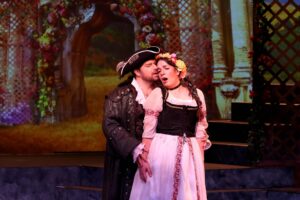
Different in nature but also splendidly notable is the third soprano who helps carry the night, Sarah Benzinger as the country maiden, Zerlina, with hair of ribbon-wrapped braids topped with a tierra of fresh flowers. On the night of her wedding, Zerlina too is wooed by Giovanni and is foolishly persuaded into his bedroom. Her vocals are pleasantly, lightly, even sweetly delivered, often coupled with a grin and air of coquettishness and strong hints of a natural naivite.
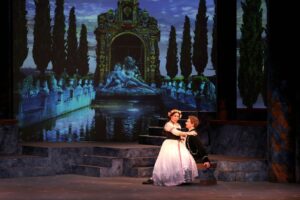
One of the night’s best directed scenes by Stage Director Richard Harrell is between Zerlina and her betrothed, Masetto. Sarah Benzinger employs a full register of notes both playful in their flirting and remorseful in their begging of forgiveness in a duet that is a mixture of pouting, tickling, and kissing as Zerlina tries to convince Masetto that she still loves him even after being lured into Giovanni’s arms.
As Masetto, Joshua Hughes sports a bass-baritone range that rings with a flavoring of full fun influenced by his peasant, countryside life. Not only does he sing impressively, but his ability to capture in his acting a comical but likable lad brings a palpable energy to every scene he wanders into, especially when he mixes pathos and hilarity as he languishes in exaggerated pain before Zerlina after he is boxed around by Giovanni.
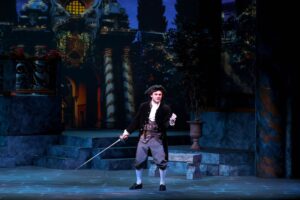
The evening’s other fiancé, Don Ottavio, is sung by Eric Levintow whose tenor voice reaches easily and clearly to master Mozart’s requirements but who often lacks the power in his volume to totally sell his part. At times, he reaches his higher notes with some strain from below rather than landing lightly on them from above; and his longer runs vary from beautifully flowing to somewhat disjointed.
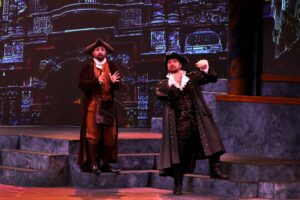
Totally successful throughout the night is Antonio Azpiri as the opera’s famed comic, Leporello, servant to Don Giovanni. With a deeply rich bass-baritone that rings solid with exacting notes, Leporello can bounce through a run of staccato notes with alacrity and sparkle. Leporello adjusts himself as convenient to the moment and the people he is with. As the imp, the fool, the co-conspirator, the grumbler, the revenge-seeker, the lover, the scaredy cat, and more, Antonio Azpiri excels in each chameleonic shift.
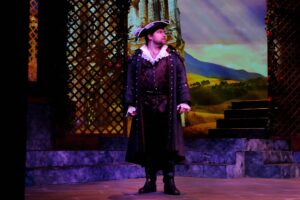
Unfortunately, less successful in his portrayal is John Allen Nelson in the title role of Don Giovanni. In all fairness, the production’s planned star was Joel Balzun, who had to withdraw due to a respiratory infection. The evening’s stand-in Giovanni often shows much baritone promise in his vocal resonance, but too often he lacks the power to sing above the accompanying orchestra or to match the vibrance of a scene with the likes of Leporello or Elvira. He fails to capture the deviousness and evil of his character and sometimes just seems too stilted and stationary in his delivery, even when that delivery does have the possibility of being spot-on vocally.
So much of the stage direction of Richard Harrell of the evening is quite masterful and clever, making full use of Peter Crompton’s multi-level, three-walled scenic design and his array of projections that range from aristocratic interiors full of grandiosity to garden scenes with their own, evident luxury to country scenes of flowers, fruit, and frivolity. Steve Mannshardt’s lighting sharply contrasts time of day and night, moments of tension and of joviality, scenes of deceit and of love. The wide range of town and country costumes designed by Callie Floor provide their own, wonderful 18th century backdrop as well as often add humor to the country folk assembled.
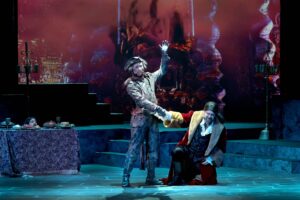
But what is usually a most dramatic climax of the Commendatore’s statue sending Giovanni to his well-deserved doom is this evening’s most disappointing section. First, the Commendatore and his statue is simply miscast in the double casting of the otherwise successfully cast Masetto, Joshua Hughes. In the role of the live, elder Commendatore, he simply appears too young; in the role of the statue, he lacks the echoing power of voice or the terrifying presence of being that the Statue usually renders in the final scenes. Not helping are the director’s choices where Giovanni’s attempt at flailing arms against projected flames do not convey adequately the horror of his final demise, especially when he then just walks off stage left to his supposed doom.
However, fortunately the evening has been blessed with many memorable performances – especially among its three sopranos. Coupled with the score itself that is delivered superbly by the maestro and his orchestra, West Bay Opera’s Don Giovanni has much to offer anyone relishing a night of one of opera’s most beloved treasures in a setting intimate and inviting.
Rating: 3.5 E
Don Giovanni continues February 19, 25, and 26, 2023 in production by West Bay Opera at Lucie Stern Theatre, 1305 Middlefield Road, Palo Alto. Tickets are available online at https://www.wbopera.org or by visiting the company’s box office at 221 Lambert Street, Palo Alto, Monday – Friday, 1 – 5 p.m. (telephone, 650-424-9999).
Please note: Proof of boostered, COVID vaccination is required of all patrons as well as the wearing of masks during the performance.
Photo Credits: Otak Jump
